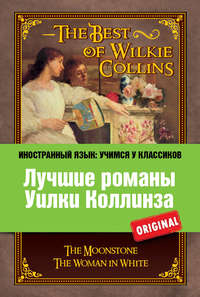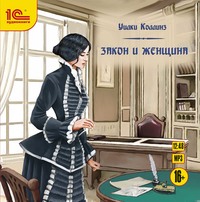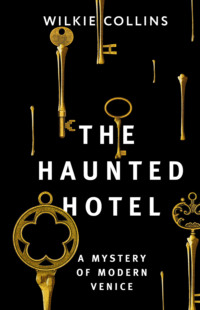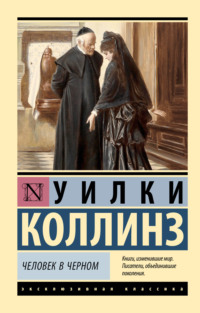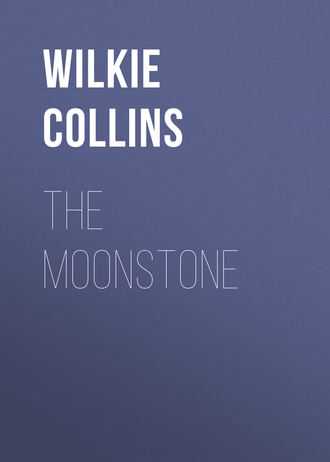
Полная версия
The Moonstone
In the first place, Mr. Godfrey was, in point of size, the finest man by far of the two. He stood over six feet high; he had a beautiful red and white colour; a smooth round face, shaved as bare as your hand; and a head of lovely long flaxen hair, falling negligently over the poll of his neck. But why do I try to give you this personal description of him? If you ever subscribed to a Ladiesâ Charity in London, you know Mr. Godfrey Ablewhite as well as I do. He was a barrister by profession; a ladiesâ man by temperament; and a good Samaritan by choice. Female benevolence and female destitution could do nothing without him. Maternal societies for confining poor women; Magdalen societies for rescuing poor women; strong-minded societies for putting poor women into poor menâs places, and leaving the men to shift for themselves;âhe was vice-president, manager, referee to them all. Wherever there was a table with a committee of ladies sitting round it in council, there was Mr. Godfrey at the bottom of the board, keeping the temper of the committee, and leading the dear creatures along the thorny ways of business, hat in hand. I do suppose this was the most accomplished philanthropist (on a small independence) that England ever produced. As a speaker at charitable meetings the like of him for drawing your tears and your money was not easy to find. He was quite a public character. The last time I was in London, my mistress gave me two treats. She sent me to the theatre to see a dancing woman who was all the rage; and she sent me to Exeter Hall to hear Mr. Godfrey. The lady did it, with a band of music. The gentleman did it, with a handkerchief and a glass of water. Crowds at the performance with the legs. Ditto at the performance with the tongue. And with all this, the sweetest-tempered person (I allude to Mr. Godfrey)âthe simplest and pleasantest and easiest to pleaseâyou ever met with. He loved everybody. And everybody loved him. What chance had Mr. Franklinâwhat chance had anybody of average reputation and capacitiesâagainst such a man as this?
On the fourteenth, came Mr. Godfreyâs answer.
He accepted my mistressâs invitation, from the Wednesday of the birthday to the evening of Fridayâwhen his duties to the Ladiesâ Charities would oblige him to return to town. He also enclosed a copy of verses on what he elegantly called his cousinâs ânatal day.â Miss Rachel, I was informed, joined Mr. Franklin in making fun of the verses at dinner; and Penelope, who was all on Mr. Franklinâs side, asked me, in great triumph, what I thought of that. âMiss Rachel has led you off on a false scent, my dear,â I replied; âbut my nose is not so easily mystified. Wait till Mr. Ablewhiteâs verses are followed by Mr. Ablewhite himself.â
My daughter replied, that Mr. Franklin might strike in, and try his luck, before the verses were followed by the poet. In favour of this view, I must acknowledge that Mr. Franklin left no chance untried of winning Miss Rachelâs good graces.
Though one of the most inveterate smokers I ever met with, he gave up his cigar, because she said, one day, she hated the stale smell of it in his clothes. He slept so badly, after this effort of self-denial, for want of the composing effect of the tobacco to which he was used, and came down morning after morning looking so haggard and worn, that Miss Rachel herself begged him to take to his cigars again. No! he would take to nothing again that would cause her a momentâs annoyance; he would fight it out resolutely, and get back his sleep, sooner or later, by main force of patience in waiting for it. Such devotion as this, you may say (as some of them said downstairs), could never fail of producing the right effect on Miss Rachelâbacked up, too, as it was, by the decorating work every day on the door. All very wellâbut she had a photograph of Mr. Godfrey in her bedroom; represented speaking at a public meeting, with all his hair blown out by the breath of his own eloquence, and his eyes, most lovely, charming the money out of your pockets. What do you say to that? Every morningâas Penelope herself owned to meâthere was the man whom the women couldnât do without, looking on, in effigy, while Miss Rachel was having her hair combed. He would be looking on, in reality, before longâthat was my opinion of it.
June the sixteenth brought an event which made Mr. Franklinâs chance look, to my mind, a worse chance than ever.
A strange gentleman, speaking English with a foreign accent, came that morning to the house, and asked to see Mr. Franklin Blake on business. The business could not possibly have been connected with the Diamond, for these two reasonsâfirst, that Mr. Franklin told me nothing about it; secondly, that he communicated it (when the gentleman had gone, I suppose) to my lady. She probably hinted something about it next to her daughter. At any rate, Miss Rachel was reported to have said some severe things to Mr. Franklin, at the piano that evening, about the people he had lived among, and the principles he had adopted in foreign parts. The next day, for the first time, nothing was done towards the decoration of the door. I suspect some imprudence of Mr. Franklinâs on the Continentâwith a woman or a debt at the bottom of itâhad followed him to England. But that is all guesswork. In this case, not only Mr. Franklin, but my lady too, for a wonder, left me in the dark.
On the seventeenth, to all appearance, the cloud passed away again. They returned to their decorating work on the door, and seemed to be as good friends as ever. If Penelope was to be believed, Mr. Franklin had seized the opportunity of the reconciliation to make an offer to Miss Rachel, and had neither been accepted nor refused. My girl was sure (from signs and tokens which I need not trouble you with) that her young mistress had fought Mr. Franklin off by declining to believe that he was in earnest, and had then secretly regretted treating him in that way afterwards. Though Penelope was admitted to more familiarity with her young mistress than maids generally areâfor the two had been almost brought up together as childrenâstill I knew Miss Rachelâs reserved character too well to believe that she would show her mind to anybody in this way. What my daughter told me, on the present occasion, was, as I suspected, more what she wished than what she really knew.
On the nineteenth another event happened. We had the doctor in the house professionally. He was summoned to prescribe for a person whom I have had occasion to present to you in these pagesâour second housemaid, Rosanna Spearman.
This poor girlâwho had puzzled me, as you know already, at the Shivering Sandâpuzzled me more than once again, in the interval time of which I am now writing. Penelopeâs notion that her fellow servant was in love with Mr. Franklin (which my daughter, by my orders, kept strictly secret) seemed to be just as absurd as ever. But I must own that what I myself saw, and what my daughter saw also, of our second housemaidâs conduct, began to look mysterious, to say the least of it.
For example, the girl constantly put herself in Mr. Franklinâs wayâvery slyly and quietly, but she did it. He took about as much notice of her as he took of the cat: it never seemed to occur to him to waste a look on Rosannaâs plain face. The poor thingâs appetite, never much, fell away dreadfully; and her eyes in the morning showed plain signs of waking and crying at night. One day Penelope made an awkward discovery, which we hushed up on the spot. She caught Rosanna at Mr. Franklinâs dressing-table, secretly removing a rose which Miss Rachel had given him to wear in his button-hole, and putting another rose like it, of her own picking, in its place. She was, after that, once or twice impudent to me, when I gave her a well-meant general hint to be careful in her conduct; and, worse still, she was not over-respectful now, on the few occasions when Miss Rachel accidentally spoke to her.
My lady noticed the change, and asked me what I thought about it. I tried to screen the girl by answering that I thought she was out of health; and it ended in the doctor being sent for, as already mentioned, on the nineteenth. He said it was her nerves, and doubted if she was fit for service. My lady offered to remove her for change of air to one of our farms, inland. She begged and prayed, with the tears in her eyes, to be let to stop; and, in an evil hour, I advised my lady to try her for a little longer. As the event proved, and as you will soon see, this was the worst advice I could have given. If I could only have looked a little way into the future, I would have taken Rosanna Spearman out of the house, then and there, with my own hand.
On the twentieth, there came a note from Mr. Godfrey. He had arranged to stop at Frizinghall that night, having occasion to consult his father on business. On the afternoon of the next day, he and his two eldest sisters would ride over to us on horseback, in good time before dinner. An elegant little casket in China accompanied the note, presented to Miss Rachel, with her cousinâs love and best wishes. Mr. Franklin had only given her a plain locket not worth half the money. My daughter Penelope, neverthelessâsuch is the obstinacy of womenâstill backed him to win.
Thanks be to Heaven, we have arrived at the eve of the birthday at last! You will own, I think, that I have got you over the ground this time, without loitering by the way. Cheer up! Iâll ease you with another new chapter hereâand, what is more, that chapter shall take you straight into the thick of the story.
9
June twenty-first, the day of the birthday, was cloudy and unsettled at sunrise, but towards noon it cleared up bravely.
We, in the servantsâ hall, began this happy anniversary, as usual, by offering our little presents to Miss Rachel, with the regular speech delivered annually by me as the chief. I follow the plan adopted by the Queen in opening Parliamentânamely, the plan of saying much the same thing regularly every year. Before it is delivered, my speech (like the Queenâs) is looked for as eagerly as if nothing of the kind had ever been heard before. When it is delivered, and turns out not to be the novelty anticipated, though they grumble a little, they look forward hopefully to something newer next year. An easy people to govern, in the Parliament and in the Kitchenâthatâs the moral of it.
After breakfast, Mr. Franklin and I had a private conference on the subject of the Moonstoneâthe time having now come for removing it from the bank at Frizinghall, and placing it in Miss Rachelâs own hands.
Whether he had been trying to make love to his cousin again, and had got a rebuffâor whether his broken rest, night after night, was aggravating the queer contradictions and uncertainties in his characterâI donât know. But certain it is, that Mr. Franklin failed to show himself at his best on the morning of the birthday. He was in twenty different minds about the Diamond in as many minutes. For my part, I stuck fast by the plain facts as we knew them. Nothing had happened to justify us in alarming my lady on the subject of the jewel; and nothing could alter the legal obligation that now lay on Mr. Franklin to put it in his cousinâs possession. That was my view of the matter; and, twist and turn it as he might, he was forced in the end to make it his view too. We arranged that he was to ride over, after lunch, to Frizinghall, and bring the Diamond back, with Mr. Godfrey and the two ladies, in all probability, to keep him company on the way home again.
This settled, our young gentleman went back to Miss Rachel.
They consumed the whole morning, and part of the afternoon, in the everlasting business of decorating the door, Penelope standing by to mix the colours as, directed; and my lady, as luncheon time drew near, going in and out of the room, with her handkerchief to her nose (for they used a deal of Mr. Franklinâs vehicle that day), and trying vainly to get the two artists away from their work. It was three oâclock before they took off their aprons, and released Penelope (much the worse for the vehicle), and cleaned themselves of their mess. But they had done what they wantedâthey had finished the door on the birthday, and proud enough they were of it. The griffins, cupids, and so on, were, I must own, most beautiful to behold; though so many in number, so entangled in flowers and devices, and so topsy-turvy in their actions and attitudes, that you felt them unpleasantly in your head for hours after you had done with the pleasure of looking at them. If I add that Penelope ended her part of the morningâs work by being sick in the back-kitchen, it is in no unfriendly spirit towards the vehicle. No! no! It left off stinking when it dried; and if Art requires these sort of sacrificesâthough the girl is my own daughterâI say, let Art have them!
Mr. Franklin snatched a morsel from the luncheon-table, and rode off to Frizinghallâto escort his cousins, as he told my lady. To fetch the Moonstone, as was privately known to himself and to me.
This being one of the high festivals on which I took my place at the sideboard, in command of the attendance at table, I had plenty to occupy my mind while Mr. Franklin was away. Having seen to the wine, and reviewed my men and women who were to wait at dinner, I retired to collect myself before the company came. A whiff ofâyou know what, and a turn at a certain book which I have had occasion to mention in these pages, composed me, body and mind. I was aroused from what I am inclined to think must have been, not a nap, but a reverie, by the clatter of horsesâ hoofs outside; and going to the door, received a cavalcade comprising Mr. Franklin and his three cousins, escorted by one of old Mr. Ablewhiteâs grooms.
Mr. Godfrey struck me, strangely enough as being like Mr. Franklin in this respectâthat he did not seem to be in his customary spirits. He kindly shook hands with me as usual, and was most politely glad to see his old friend Betteredge wearing so well. But there was a sort of cloud over him, which I couldnât at all account for; and when I asked how he had found his father in health, he answered rather shortly, âMuch as usual.â However, the two Miss Ablewhites were cheerful enough for twenty, which more than restored the balance. They were nearly as big as their brother; spanking, yellow-haired, rosy lasses, overflowing-with superabundant flesh and blood; bursting from head to foot with health and spirits. The legs of the poor horses trembled with carrying them; and when they jumped down from their saddles (without waiting to be helped), I declare they bounced on the ground as if they were made of india-rubber. Everything the Miss Ablewhites said began with a large O; everything they did was done with a bang; and they giggled and screamed, in season and out of season, on the smallest provocation. Bouncersâthatâs what I call them.
Under cover of the noise made by the young ladies, I had an opportunity of saying a private word to Mr. Franklin in the hall.
âHave you got the Diamond safe, sir?â
He nodded, and tapped the breast-pocket of his coat.
âHave you seen anything of the Indians?â
âNot a glimpse.â With that answer, he asked for my lady, and, hearing she was in the small drawing-room, went there straight. The bell rang, before he had been a minute in the room, and Penelope was sent to tell Miss Rachel that Mr. Franklin Blake wanted to speak to her.
Crossing the hall, about half an hour afterwards, I was brought to a sudden standstill by an outbreak of screams from the small drawing-room. I canât say I was at all alarmed; for I recognised in the screams the favourite large O of the Miss Ablewhites. However, I went in (on pretence of asking for instructions about the dinner) to discover whether anything serious had really happened.
There stood Miss Rachel at the table, like a person fascinated, with the Colonelâs unlucky Diamond in her hand. There, on either side of her, knelt the two Bouncers, devouring the jewel with their eyes, and screaming with ecstasy every time it flashed on them in a new light. There, at the opposite side of the table, stood Mr. Godfrey, clapping his hands like a large child, and singing out softly, âExquisite! exquisite!â There sat Mr. Franklin in a chair by the bookcase, tugging at his beard, and looking anxiously towards the window. And there, at the window stood the object he was contemplatingâmy lady, having the extract from the Colonelâs Will in her hand, and keeping her back turned on the whole of the company.
She faced me, when I asked for my instructions; and I saw the family frown gathering over her eyes, and the family temper twitching at the corners of her mouth.
âCome to my room in half an hour,â she answered. âI shall have something to say to you then.â
With those words she went out. It was plain enough that she was posed by the same difficulty which had posed Mr. Franklin and me in our conference at the Shivering Sand. Was the legacy of the Moonstone a proof that she had treated her brother with cruel injustice? or was it a proof that he was worse than the worst she had ever thought of him? Serious questions those for my lady to determine, while her daughter, innocent of all knowledge of the Colonelâs character, stood there with the Colonelâs birthday gift in her hand.
Before I could leave the room in my turn, Miss Rachel always considerate to the old servant who had been in the house when she was born, stopped me. âLook, Gabriel!â she said, and flashed the jewel before my eyes in a ray of sunlight that poured through the window.
Lord bless us! it was a Diamond! As large, or nearly, as a ploverâs egg! The light that streamed from it was like the light of the harvest moon. When you looked down into the stone, you looked into a yellow deep that drew your eyes into it so that they saw nothing else. It seemed unfathomable; this jewel, that you could hold between your finger and thumb, seemed unfathomable as the heavens themselves. We set it in the sun, and then shut the light out of the room, and it shone awfully out of the depths of its own brightness, with a moony gleam, in the dark. No wonder Miss Rachel was fascinated: no wonder her cousins screamed. The Diamond laid such a hold on me that I burst out with as large an âOâ as the Bouncers themselves. The only one of us who kept his senses was Mr. Godfrey. He put an arm round each of his sistersâ waists, and, looking compassionately backwards and forwards between the Diamond and me, said, âCarbon, Betteredge! mere carbon, my good friend, after all!â
His object, I suppose, was to instruct me. All he did, however, was to remind me of the dinner. I hobbled off to my army of waiters downstairs. As I went out, Mr. Godfrey said, âDear old Betteredge, I have the truest regard for him!â He was embracing his sisters, and ogling Miss Rachel, while he honoured me with that testimony of affection. Something like a stock of love to draw on there! Mr. Franklin was a perfect savage by comparison with him.
At the end of half an hour, I presented myself, as directed in my ladyâs room.
What passed between my mistress and me, on this occasion, was, in the main, a repetition of what had passed between Mr. Franklin and me at the Shivering Sandâwith this difference, that I took care to keep my own counsel about the jugglers, seeing that nothing had happened to justify me in alarming my lady on this head. When I received my dismissal, I could see that she took the blackest view possible of the Colonelâs motives, and that she was bent on getting the Moonstone out of her daughterâs possession at the first opportunity.
On my way back to my own part of the house, I was encountered by Mr. Franklin. He wanted to know if I had seen anything of his cousin Rachel. I had seen nothing of her. Could I tell him where his cousin Godfrey was? I didnât know; but I began to suspect that cousin Godfrey might not be far away from cousin Rachel. Mr. Franklinâs suspicions apparently took the same turn. He tugged hard at his beard, and went and shut himself up in the library with a bang of the door that had a world of meaning in it.
I was interrupted no more in the business of preparing for the birthday dinner till it was time for me to smarten myself up for receiving the company. Just as I had got my white waistcoat on, Penelope presented herself at my toilet, on the pretence of brushing what little hair I have got left, and improving the tie of my white cravat. My girl was in high spirits, and I saw she had something to say to me. She gave me a kiss on the top of my bald head, and whispered, âNews for you, father! Miss Rachel has refused him.â
âWhoâs âhimâ?â I asked.
âThe ladiesâ committee-man, father,â says Penelope. âA nasty fly fellow. I hate him for trying to supplant Mr. Franklin!â
If I had had breath enough, I should have certainly protested against this indecent way of speaking of an eminent philanthropic character. But my daughter happened to be improving the tie of my cravat at that moment, and the whole strength of her feelings found its way into her fingers. I never was more nearly strangled in my life.
âI saw him take her away alone into the rose-garden,â says Penelope. âAnd I waited behind the holly to see how they came back. They had gone out arm-in-arm, both laughing. They came back, walking separate, as grave as grave could be, and looking straight away from each other in a manner which there was no mistaking. I never was more delighted, father, in my life! Thereâs one woman in the world who can resist Mr. Godfrey Ablewhite, at any rate; and, if I was a lady, I should be another!â
Here I should have protested again. But my daughter had got the hair-brush by this time, and the whole strength of her feelings had passed into that. If you are bald, you will understand how she scarified me. If you are not, skip this bit, and thank God you have got something in the way of a defence between your hair-brush and your head.
âJust on the other side of the holly,â Penelope went on, âMr. Godfrey came to a standstill. âYou prefer,â says he, âthat I should stop here as if nothing had happened?â Miss Rachel turned on him like lightning. âYou have accepted my motherâs invitation,â she said; âand you are here to meet her guests. Unless you wish to make a scandal in the house, you will remain, of course!â She went on a few steps, and then seemed to relent a little. âLet us forget what has passed, Godfrey,â she said, âand let us remain cousins still.â She gave him her hand. He kissed it, which I should have considered taking a liberty, and then she left him. He waited a little, by himself, with his head down, and his heel grinding a hole slowly in the gravel walk; you never saw a man look more put out in your life. âAwkward!â he said between his teeth, when he looked up, and went to the houseââvery awkward!â If that was his opinion of himself, he was quite right. Awkward enough, Iâm sure. And the end of it is, father what I told you all along,â cries Penelope, finishing me off with a last scarification, the hottest of all. âMr. Franklinâs the man!â
I got possession of the hair-brush, and opened my lips to administer the reproof which, you will own, my daughterâs language and conduct richly deserved.
Before I could say a word, the crash of carriage-wheels outside struck in, and stopped me. The first of the dinner-company had come. Penelope instantly ran off. I put on my coat, and looked in the glass. My head was as red as a lobster; but, in other respects I was as nicely dressed for the ceremonies of the evening as a man need be. I got into the hall just in time to announce the two first of the guests. You neednât feel particularly interested about them. Only the philanthropistâs father and motherâMr. and Mrs. Ablewhite.
10
One on top of the other the rest of the company followed the Ablewhites, till we had the whole tale of them complete. Including the family, they were twenty-four in all. It was a noble sight to see, when they were settled in their places round the dinner-table and the Rector of Frizinghall (with beautiful elocution) rose and said grace.


